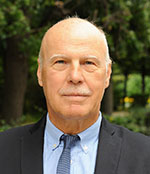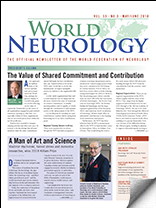Prof. Dr. Wolfgang Grisold
My name is Dr. Wolfgang Grisold. I am a neurologist from Austria, and I want to apply for a second term for the position of the secretary general of the World Federation of Neurology (WFN).

Wolfgang Grisold
My main motivation to keep the position as secretary general is to ensure continuity and coherence. Over the past years, I was strongly involved in realizing various successful initiatives, projects, and global cooperations on behalf of the WFN. Pursuing these efforts, strengthening global connections, and applying best practices to new projects will be at the heart of my agenda.
My work as secretary general is driven by the conviction to understand and build upon the needs of neurological patients worldwide. Equally important is also the prevention of disease. In that regard, the WFN has realized a number of initiatives, such as patient education and the patient days at the World Congresses of Neurology (WCN). I am convinced that these initiatives will need to be further developed and included firmly in our culture.
I have been an elected trustee of the WFN since 2009 and was elected as both the secretary general and treasurer at the 2013 WCN in Vienna. The separation of the two functions, executed in 2015, was an important move for the improvement of the structure and governance of the WFN. In the position of the secretary general, I was in close contact with the officers, the trustees, and our member societies. The WFN traditionally has several committees, which focus on specific topics and are a valuable source of advice for the WFN. Also the Applied Research Groups (ARG) aim to increase the scientific standards in neurology worldwide. It is an important task of the secretary general, that both the committees and the ARGs are close to the officers of the WFN and work synergistically.
During the past years, the WFN streamlined its organization, and in addition to the previous agenda, it has been able to successfully add new activities and agendas. Examples are the well-established educational activities such as Junior Traveling Fellowships, department visits, and the creation and implementation of WFN teaching centers. These activities have been developed over several years, and I was involved in establishing and promoting these activities. We are also proud to be able to keep up the WFN-AAN Palatucci course at our world congresses, which successfully promotes the important role of advocacy of the WFN, as an important symbol of importance.
The WFN has also been successful in working with other societies in global activities such as the Global Neurology Network and the World Brain Alliance. The World Brain Day has promoted several topics, as for example epilepsy with the ILAE and stroke with the WSO.
The World Brain Day was established at the WCN 2013 in Vienna, in particular by the advocacy committee chaired by Prof. Wasay. Through joint efforts with the WFN London office and trustees, and professional press support, it gained sustainable and quotable success. As mirrored by countless press quotes, the World Brain Day has a far-reaching international effect.
The communicative efforts of the WFN are individually strong but still need a more synchronous appearance to be even more effective. In addition to the Journal of Neurological Sciences, eNeurologicalSci is now indexed in Pubmed. Our newsletter World Neurology, the WFN social media and WFN website, including the new video platform, are drawing global attention to promoting neurology, and serving the interests of the society, and still have a great potential for further development for education.
The WFN has an important neuropolitical role, and in addition to the relations with many other specialist neurological societies, aims toward an increased connection and shared work with the WHO. In addition to the successful global activities of the past and present president, the WFN was also invited to the regional WHO meeting in Budapest last year, and were able to position a statement on neurology and environment. (See http://www.euro.who.int/en/about-us/governance/regional-committee-for-europe/67th-session/statements-from-non-state-actors.)
My role as the secretary general is not only continuity, but also to help and support the development of new ideas, strategies, and concepts. •
